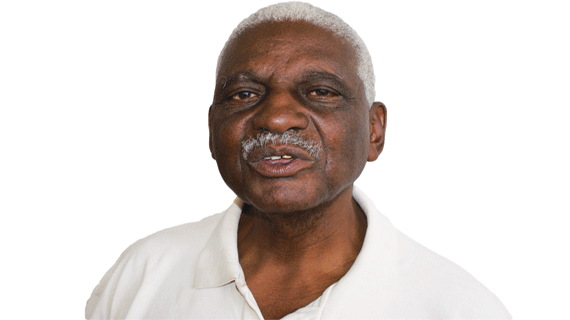
IT IS important to know many words in a language so that one is able to choose the correct word to convey the right meaning of what the speaker wants to say. For example the word tshaya has a variety of meanings depending on how that tshaya is executed.
The words betha and gqimiza both covey the meaning of tshaya, but it doesn’t sound right to say, wadobha induku wambetha uduma ekhanda in the same way that it would be wrong to say, unina wamgqimiza umntwana ngempama wayawela laphaya.
If you exchange the words in the sentences then you are correct. Ukutshaya ngenduku ekhanda yikugqimiza kanti ukutshaya ngempama yikubetha.
The word betha is even wider than just ngempama because it may also refer to any mild/light beating. Other correct words for beating with the hand are: Wankala/Makala. You wankala with an open palm.
Mukula: Umukula Ngesandla
Muhluza: umuhluza esihlathini kuthi muhlu loba emlonyeni. Abanye bathi yikumahlaza. Hlankala: Ngizakuhlankala ngenhlanekela (I will hit you with the back of my open hand).
Qhakala: A sharp hit with an open hand — ngizakuqhakala ngempama.
Nqinda: Tshaya ngenqindi. Wanginqinda esihlathini. Dutshuza: Wangidutshuza esifubeni mina ngambuyisela ngammhluza umlomo wopha. Dutshuza is hitting with a thud and with a clenched fist.
- Chamisa under fire over US$120K donation
- Mavhunga puts DeMbare into Chibuku quarterfinals
- Pension funds bet on Cabora Bassa oilfields
- Councils defy govt fire tender directive
Keep Reading
Gqimiza: Hit with a hard object on the head to cause a gushing wound. The following sentences illustrate how these tshaya words are used:
- Abantwana laba ngizababetha lamuhla bangadlalisa itshukela,
- Ube ngiqamblela amanga ngamhlankala ngempama wawela phansi,
- Uyisekazi wamwakala ngempama wakhala,
- Ungangibhedeli ngizakumukula ngenqindi
- Wangimuhluza emakhaleni ngantshaza umophelo,
- Okungumntwana okwakumdelela wakuhlankala kwaze kwacimeza,
- Ngamnqinda ehlafunweni wabongolela njengenkomo,
- Umfana wadutshuza uyise esiswini wabotshwa ngamapholisa,
- Umfazi wadobha insimbi wagqimiza umkakhe uduma ekhanda.
You should now be able to use the right word for the kind of beating (ukutshaya) that you are talking about. It is more effective, for instance, to say: wammuhluza umlomo wopha than to say, wamtshaya.
Another useful word for tshaya is qhunsa when you beat with a soft stick (uswazi) or umchilo longabe imvubu. kuthiwa, wakhwixina (1a) uswazi lomklampunzi wamqhunsa indletshana lezi. There is also hwahwatha ngoswazi and vavatha ngomzaca kumbe ngemfe or whatever is stick-like.
Njalo umuntu uyamqobola ikhanda ngogodo. The word hlukuluza does not imply actual beating, but it is close to it as it refers to “roughing” somebody physically with the intention of beating him. Yindaba ungihlukuluza uze uphose ungiwise?
There are several slang or borrowed words which are in common use among some Ndebele communities. Some of them are: katsa: usonile ngizamkatsa angalahla imali yami. It implies beating with uswazi or umchilo like qhunsa .
Karabha: Uyise wabafica bebhema igwayi wabakarabha baze bangcolisa amabhulugwe.
Ratha: Suka lapha, ngizakuratha nxa ungezwa. Uyalibona ibhanti leli?
These are different ways and means of ukutshaya. Ukuhamba lokugijima (Walking and running. The translation does not convey the same meaning). Running is a faster manner of walking.
In Ndebele you express walking fast by substituting isa in place of final a of hamba. Some grammarians prefer to say that you add isa to the verb root hamb and so hambisa. (We are not talking grammar here). You say bengihambisa ngokuba bese ngiphuzile. wangitshiya ngoba wayehambisa kakhulu.
There are other forms of walking or running in a particular way: hamba nyovane- you are looking forward, but you are taking steps backwards ( you are reversing , as it were). Wabona inyoka wase ehamba nyovane ukuze angayinyatheli. ungahambi nyovane uzawela egodini.
Hamba lugege which means walk sideways. Intuba ibincinyane yikho ungene ehamba lugege. amasotsha abe ematsha ehamba lugege.
Quma: yikuhamba ulandela ummango omfitshane usiya endaweni ethile ngathi ngisiya eNkulumane ngatshiya umgwaqo we Khelivini ngaquma eTshabalala nguthutshela e Ziphaleni.
Nqenqa: uyayibhoda indawo kungathi uyayesaba.
Sasisesaba izigebengu zeMpopoma sanqenqa ngomgwaqo weKhami sayathutshela eKhelivini. It is obvious that Ndebele is rich in language and it has a wide vocabulary which speakers should tap to give exact meanings of what they intend to say.
Many people lack this knowledge of Ndebele words and then wrongfully claim that the Ndebele language has limited vocabulary and fails to express certain ideas.
That is not true.










